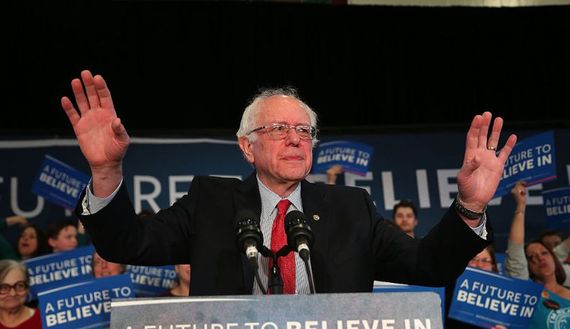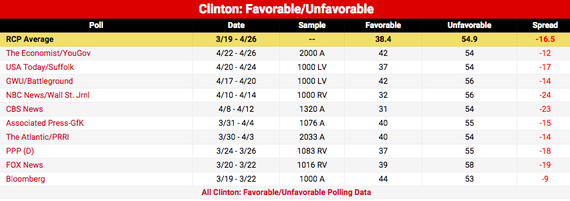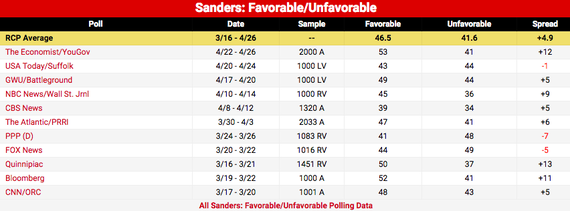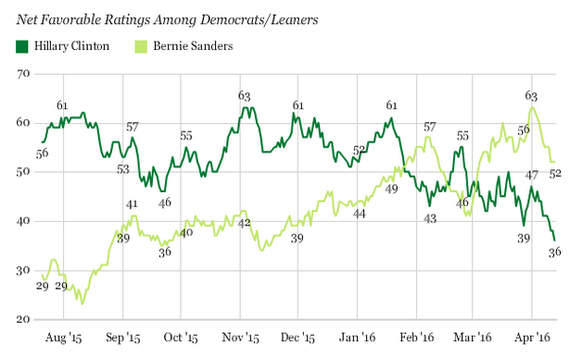First, let's talk about math. To date, Bernie Sanders has won over 45 percent of the pledged delegates. That means Sanders needs to win approximately 66 percent of the remaining delegates in order to overtake Clinton before the convention.
It's an uphill climb no doubt, but Sanders has been climbing uphill this entire election cycle. Plus, there are over 800 pledged delegates still up for grabs.
Okay, we've covered the pledged delegates. However, that's only half of the story.
As it stands today, Clinton has 524 superdelegates. Sanders only has 40. The good news if you're a Sanders supporter is that none of these superdelegates have actually voted yet. In fact, none of them will vote until the convention. That's why these superdelegates are often referred to as "unbound." They still have time to decide which candidate they want to support, no matter who they prefer right now.
In 2008, you might recall that the superdelegates, who had previously pledged their support to Hillary Clinton, switched over to back Barack Obama at the convention. Now you might be thinking, well of course they flipped then; Obama was leading in both pledged delegates and the popular vote. Sanders is leading in neither category.
You'd be absolutely right to think this. After all, Clinton is leading Sanders by 276 pledged delegates and millions of votes. The superdelegates couldn't possibly flip. They're supposed to represent the will of the people, right? They would never go against the popular vote, let alone the pledged delegate count, right? Nope, not right.
Superdelegates are there for one reason: to pick winners. They, as much as the Democratic voters, want to see a Democrat in the White House. They do not want to see Donald Trump step foot in the Oval Office. They will do virtually anything to prevent this. Don't believe me? Why then are Alaskan superdelegates still supporting Clinton even though Sanders won overwhelmingly in that state?
The answer is simple: superdelegates think that Clinton is the best (or at least the most electable) candidate. They aren't listening to the will of the people. They're making their own decisions about what's best for the Democratic Party. Fair enough.
So isn't it possible that even if Sanders finishes the race behind in both pledged delegates and the popular vote, that superdelegates can still vote for him? Sure. It's possible, but superdelegates have never gone against the popular vote. This would be an unprecedented scenario that would incite deep controversy within the Party.
Nevertheless, we've already discussed the purpose of superdelegates: to pick winners. Fortunately for Sanders, poll after poll shows that he is hands down the strongest general election candidate. The fact that Clinton performs significantly worse than Sanders against Donald Trump is NOT a small detail. The superdelegates are smart, talented politicians. They will absolutely have to consider this fact.
Here are 5 reasons why the superdelegates would indeed switch to Sanders.
1. All recent data confirms that Sanders beats Trump by a larger margin than Clinton. Some will argue that this is because Sanders has not yet been vetted by Republicans, as Clinton has been for years. This may hold some truth but it is only a partial explanation for the polls. The reality is, Sanders matches up far better against Trump because of his record. People like Sanders and Trump because they opposed the war in Iraq. People like Sanders and Trump because they opposed trade deals that sent American jobs overseas. People like Sanders and Trump because they don't take big money from super PACs, Wall Street or the fossil fuel and pharmaceutical industries. On the flipside, people dislike Clinton because she voted to authorize the trillion-dollar war in Iraq, supported disastrous trade deals that cost millions of Americans their jobs and continues to take big money from special interests.
Take a look at that data. The numbers in blue are what you want to pay attention to. Notice how Sanders has much larger numbers than Clinton?
Clinton: +6.4, +6, +13, -2, +7, +11, +3, +7
Sanders: +13, +11, +16, +12, +15, +10, +14
That's because Sanders is doing much better than Clinton at beating Trump! Sanders is consistently, and I mean every-single-time-consistently beating Trump by double digits. Clinton, on the other hand, barely beats Trump at all. In fact, in one poll, Trump is beating her.
On top of all of that, there's the whole favorability issue. Both Clinton and Trump would set the record for the lowest favorability ratings of any two nominees. Sanders, on the other hand, has record-high favorability ratings. Finally, and perhaps most importantly, let's not forget about the Bernie or Bust movement. A solid subset of Sanders supporters will not under any circumstances vote for any candidate other than Sanders. This is a unique phenomenon. In 2008, there was no Clinton or Bust movement. Had there been one, the superdelegates would have been more inclined to nominate Clinton or at the very least, Obama would have been more likely to select Clinton as his Vice President.
The key data (above) is on the far right. Notice how all of Clinton's numbers are negative? That's because she has negative favorability ratings in every single poll.
Notice, in the data above, how Sanders has mostly positive numbers? That's because he has mostly positive favorability ratings. To be blunt, that means most people don't like Clinton but they do like Sanders.
2. Sanders outperforms Clinton among both independents and Republicans. Sanders' path to the nomination, though narrow, is predicated on the hope that superdelegates will acknowledge his dominance among independents and switch their allegiance over to him. After all, independents can and will vote by the millions in a general election. The general election is not closed like New York's primary. Bernie Sanders is far better positioned for a general election than he was for the Democratic primary, where in many states, independents and Republicans could not vote Democratic.
3. Sanders is outraising Clinton through the single most historic grassroots fundraising campaign in US history, without the help of an official super PAC. It's going to take not only passion, but also cold hard cash to stop Trump. And Sanders, unlike Clinton, has a seemingly endless source of it: the people.
4. Democrats win when there is a large voter turnout. Sanders dominates the youth vote and can inspire the record turnouts needed to defeat Trump.
5. The Clinton campaign is riddled with scandals and an FBI investigation. Sanders, by contrast, has become known as an honest, trustworthy, authentic candidate whose history is often associated with fighting for Civil Rights. Remember, Sanders was marching with Martin Luther King Jr. while Clinton was campaigning for Barry Goldwater, who opposed the Civil Rights Act.
Okay, let's not get carried away here. There are two sides to every story. Let's now discuss why the superdelegates would not support Sanders over Clinton.
1. Despite the data, many people still think Clinton is the toughest matchup for Trump. She's battletested. She's experienced. She can get the job done. There's also the whole gender component. Clinton of course would be the first woman president in the United States. That's nothing short of historic. And with Trump performing so egregiously among women voters, wouldn't it make sense to nominate a woman to defeat him once and for all?
2. Clinton is winning! This is perhaps the single most important reason why superdelegates would not support Sanders. It would be the first time in history that superdelegates went against the popular vote. Even if Clinton is suffering embarrassing loss after embarrassing loss, she's still winning the pledged delegates. She's still winning the popular vote. She's still winning with older voters. She's still winning with black and Hispanic voters and Democrats know they need to cash in on the non-white vote in November.
3. This one if often overlooked and highly controversial. Clinton is six years younger than Sanders. This may not sound like a major age difference, but given the fact that women tend to live longer than men, there is reason to believe that Clinton (68) will be around longer than Sanders (74).
4. While Sanders may have a crossover appeal among independents and Republicans, it's Clinton who's more moderate and potentially more likely to attract "stop-Trump" voters positioned in the center of the political divide. The flipside to this argument is that many Trump supporters actually prefer Sanders to Clinton, due to issues related to character, policy and campaign financing.
5. There is no denying what's coming next. Clinton is, by all accounts, the establishment candidate and it's for this reason that the superdelegates, most of whom are also establishment politicians, vehemently support her. It's hard to imagine that these superdelegates are ready to join the political revolution that in certain respects will shake up the Democratic establishment forever. That being said, 2016 is quite frankly the year of the anti-establishment. Trump is surging because people across parties are sick of the same old shit. They want an outsider who can bring about radical change. While Sanders has been in politics for over 30 years (and in that sense, is part of the establishment), he has long been considered an anti-establishment outsider. Why would superdelegates offer up Clinton, a nominee who epitomizes the establishment, when they could instead nominate Sanders, who like Trump, represents the antithesis of everything that millions have grown to resent?
As you see, there are plenty of good reasons for superdelegates to back Sanders. But, there are also plenty of good reasons for them to support Clinton. One might conclude that certain superdelegates will be convinced by Sanders' argument, while others will cling to Clinton's. This would result in certain superdelegates switching to Sanders and others remaining loyal to Clinton. It's unlikely, though possible, that all of the superdelegates will be convinced by either candidate's set of arguments.
Should all 524 superdelegates that are (unofficially) supporting Clinton actually switch over and vote for Sanders, Sanders would win the nomination by a landslide.
Should all 40 superdelegates that are (unofficially) supporting Sanders switch over to Clinton, Clinton would clinch the nomination by an ever larger landslide.
In the end, the Democratic nomination for president will be decided by the superdelegates, which is what makes this primary both fascinating and horrifying.
Neither Sanders nor Clinton will finish the race with enough pledged delegates (2,383) in order to win without the superdelegates pushing them over the top.
Before you lose hope and say, "It's rigged! Why even vote?" remember that it was the voters who got both Sanders and Clinton in positions where both can still win.
Sanders and Clinton have both earned enough pledged delegates to be within striking distance of the magic number (2,383). Right now, Clinton is much closer to that number, but Sanders is banking on big wins (mostly in California) to catch up.
Really though, it doesn't matter all that much how close Sanders gets to 2,383. After all of this talk about the Republican convention being contested, the irony is, it's the Democratic convention that will be contested and ultimately decided by Party elites.
The deeper irony is the superdelegate system itself. The GOP establishment desperately needs superdelegates in order to stop Donald Trump. But it's the Democratic Party that actually has the superdelegates and it's those superdelegates who will select Trump's opponent and in effect, dictate the future of our Republic.
--
Follow the author on Instagram for more coverage of the Sanders campaign.








